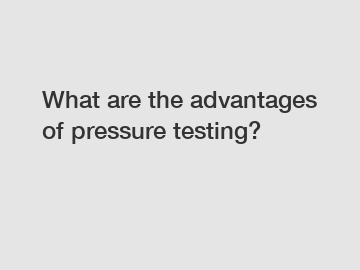What are the advantages of pressure testing?
Advantages of Pressure Testing: Ensuring Safety and Reliability for Critical Systems.
Imagine a scenario where a high-pressure pipeline fails unexpectedly due to undetected flaws or weaknesses. The consequences could be catastrophic, resulting in significant damage, costly repairs, and potential harm to human lives. This is where pressure testing—the process of subjecting objects or systems to specific pressures—becomes crucial. In this blog, we will delve into the numerous advantages of pressure testing, highlighting its role in ensuring safety, reliability, and efficiency for critical systems.
With decades of experience and expertise in the field, we are proud to bring you authoritative insights on the benefits of pressure testing. Whether you are involved in the oil and gas industry, aviation, manufacturing, or any sector that deals with high-pressure systems, understanding the advantages of pressure testing is paramount.

1. Detecting Weaknesses and Flaws:
One of the primary advantages of pressure testing is its ability to uncover weaknesses or flaws prior to system deployment. By pressurizing the system beyond its expected operating limits, any issues such as leaks, cracks, or joint failures can be identified and addressed. This crucial step helps eliminate potential hazards and ensures that the system is reliable from the outset.
2. Safety Assurance:
Safety is paramount in industries where high pressures are involved. Pressure testing provides an added layer of assurance by ensuring that critical systems can withstand the expected operating conditions. By verifying the system's integrity, pressure testing reduces the risk of accidents, malfunctions, or failures, thereby safeguarding personnel, assets, and the environment.
3. Compliance with Regulations and Standards:
Industries operating under strict regulatory frameworks cannot afford to compromise on safety standards. Pressure testing plays a vital role in complying with regulations set forth by authoritative bodies. By conducting thorough tests and adhering to specific guidelines, businesses can meet regulatory requirements, mitigating potential legal or reputational risks.
4. Enhanced Reliability:
Uninterrupted operation of critical systems is essential in industries such as power generation, manufacturing, and aerospace. Regular pressure testing ensures the reliability of these systems, preventing unexpected breakdowns or downtime that may incur significant financial losses. By identifying and addressing potential weaknesses, pressure testing improves overall system reliability, leading to increased productivity and customer satisfaction.
5. Cost Savings:
Although pressure testing may require an investment in terms of time and resources, it ultimately leads to long-term cost savings. By detecting and addressing flaws during the testing phase, businesses can avoid expensive repairs, downtime, or emergency shutdowns in the future. Moreover, reliable systems reduce the need for frequent maintenance, resulting in further cost efficiency over time.
6. Improved Product Quality:
Pressure testing not only benefits large-scale systems but also contributes to improving product quality during the manufacturing process. By subjecting individual components to pressure tests, manufacturers can ensure that their products meet the desired specifications and operate safely in real-world conditions. This leads to enhanced customer satisfaction, reduced product recalls, and increased brand reputation.
7. Innovation and Creativity:
Pressure testing encourages innovation and creative problem-solving in engineering and design processes. As engineers face the challenge of meeting increasingly stringent safety requirements, they must devise novel solutions to ensure system integrity. Pressure testing acts as a catalyst for pushing boundaries, stimulating research and development, and ultimately driving innovation in various industries.
8. Future-Proofing:
As technology evolves and operating conditions become more extreme, pressure testing helps future-proof critical systems. By subjecting systems to higher pressures or simulating various environmental conditions, businesses can take proactive measures to ensure their systems remain safe and reliable in the face of emerging challenges. This forward-thinking approach minimizes the need for frequent system upgrades or replacements, saving resources in the long run.
In conclusion, pressure testing offers manifold advantages, from detecting weaknesses and ensuring safety compliance to enhancing reliability and product quality. By investing in pressure testing, companies can protect lives, assets, and the environment while maximizing efficiency and productivity. Trusting and adhering to the expertise of experienced professionals in the field of pressure testing is the surest way to safeguard your operations and secure a brighter, safer future.
For more information, please visit air intensifier, hydrogen booster pump, pneumatic pressure amplifiers.


